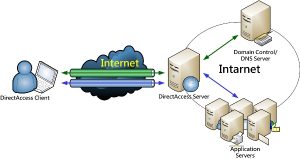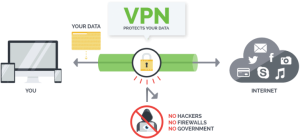Hey. I would like to know how to protect online privacy data from ISP. To be honest, I am disappointed when the Congress revoked FCC’s privacy rules. I don’t feel safe when using the Internet now. Would you please help me protect my privacy?
As we know, the Congress shot down FCC’s privacy rules. That means that the ISPs are able to sell users’ online privacy data to the third parties without users’ permission. Some users may be shock when hearing this news, wondering how they can do that. In fact, the ISPs can do many things without your notice.
In the first place, they can obtain your cellphone record and collect all URLs you visited. You may note that some apps are already installed when you first buy the phone. They can insert tracking headers into all our customers’ traffic.The apps are installed not only to deliver advertisements, but also can track you when browsing. Though you may delete the cookies, those apps can resurrect them. In the second place, they can inject ads into your browser when snooping through your traffic. Those ads mainly are customized according to your browsing habits. It hijacks your search queries and redirects you to the third parties’ websites that users never intend to visit. Last but not least, the ISPs are able to sell users’ online privacy data to the third parties without asking for users’ permission. We all know that the ISPs are sitting on a gold mine of users data. They can sell your location, demographics, and browsing history to marketers. The ISPs do all those things for revenue. They make lots of money from their users.
After hearing what the ISPs can do with your online privacy, don’t you want to do something to stop them? You may have no idea how to get started if you know little about Internet connection. Let us show you. What you need to do now is encrypting your connection. One of the most effective and popular ways is using a virtual private network or VPN. Your connection will encrypted in a “tunnel.” Others will not able to spy on your online activities and steal online privacy data.
VPN stands for Virtual Private Network. It creates an encrypted and secure connection between you and the website you are visiting. The VPN server plays the role of a middleman between you and the website that you are visiting. Given that the network traffic between you and websites is encrypted like a tunnel, the ISP will have no idea of your traffic emerges without signs of who you are or where you’re connecting from. The VPN server provides new IPs to replace your real IP. Having the new IPs from a VPN server, you have a new ID online which is not related to your real name. You can be a US, UK, Chinese, Japanese or any other countries’ Internet users. They don’t know your real name according to the IP address because this one is not related to your real identity. Your Internet privacy is highly protected. The VPN also helps you access website and services blocked by firewall and other restriction. You can use the same computer while browsing as a different user online. You stay anonymous from the ISP. The ISP doesn’t know who you really are and what you are doing online.


How VPN works while you are trying to access a website?
In order to let you know the functions of VPN, let’s talk about how it works in detail. You run VPN and click on link you want to visit. The browser sends encrypted your account & password and request to your VPN service first. Then, VPN service decrypts the communication and sends it to the targeted website. After the website receives data, it generates session cookie and send it to your VPN service. VPN encrypts the session data it received and then sends it back to your device. In this way, you can view the website you like after your browser received the session cookie. You may think that the process is too complicated and it will take a long time before you can access the targeted website. In fact, everything we mentioned above happens at an amazing and unbelievable speed. In the blink of an eye your request will be sent and everything will respond. Your Internet connection is secure, encrypted and extremely fast with VPN service.
Problems that you may meet while using VPN service
Problem 1: I can connection VPN service via 4G mobile data on my phone, but I can’t connect it via WiFi hotspot? I saw WIFi signal bar there while it still used my mobile data.
The problem may be that WiFi hotspot sets limits on VPN connection. NAT of VPN, namely PPTP/L2TP has been limited. WiFi hotspot refuses to transfer your data to the VPN service.
Problem 2: I failed to visit some regular websites after I turned off VPN. I could access those websites before I first used VPN. I am a Chinese user and I use VPN service to access Dropbox, Vimeo, Facebook, Twitter and watch Youtube. Now, I can’t visit my favorite Chinese websites in a normal way. I have to run VPN so that I can access them.
Firstly, there may be something wrong with your routing tables. Check your default route and VPN gateway.
Secondly, your DNS may have been hijacked. Check your DNS and scan your computer for malicious programs
Thirdly, it may be the mechanism network problem or Internet proxy. Check your Internet settings.
Fourthly, it may be caused by non-normal exit. Next time, remember quit it in a normal way.
Problem 3: I can’t access local area network after I connect to VPN.
It may be caused by IP address conflict. Check your network line and correct the settings. Find your original gateway address via command.
Problems 4: Why I have blue screen after I run VPN?
Probably, your drive is not compatible with the VPN service you use. Besides, some anti-virus programs, game protection drive and bank security controls will bring blue screen when you use VPN.
Video shows how to protect your online privacy data from ISP
In this ad age, your age, gender, location, demographics, browsing histories and other personal information are very precious for the markers. They would try as many ways as possible to gather the data for their ads. As it is no secret that ISPs are able to monitor users’ online activities and record information from your connection, many of them choose to sell users’ online privacy data without approval for money. The FCC’s Internet privacy rules were about protect users’ rights. However, the Congress repealed them. No more rules are there to protect your online privacy data. You need to do it on your own. Luckily, you can simply use a VPN to do that. The VPN creates a secure, encrypted connection between your device (computer, phone and tablet etc.) and a private server. That prevents others spying on your traffic and invading your privacy. Once connected to a VPN, your connection will be secure, fast and stable. Neither the ISPs nor hackers are able to snoop through your traffic. You can use your private information on reliable websites freely without worrying about information leak. Don’t hesitate. Get a VPN to protect your online privacy data from ISP right now!
Kindly Reminder: If you have any question regarding how to Set up VPN on your device, please live chat with YooCare online expert for help.
Published by & last updated on September 28, 2017 5:55 am



Leave a Reply
You must be logged in to post a comment.